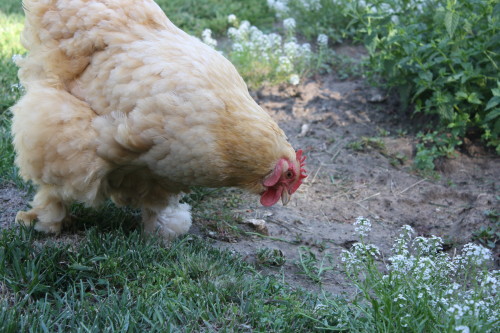What to do When a Hen is Egg Bound?

I came home the other night to find one of my hens dead. She had hidden herself in the corner of the coop, near the feed bin.
It was sad, because I love watching my girls cluck and scratch around the yard, and I will miss the eggs, but losing livestock on a homestead is not uncommon, it’s part of the farm life. That doesn’t mean it’s easy or something we get use to. A farmer NEVER likes to lose livestock because it’s lost income or food. But, aside from the financial considerations, farmers are the most animal loving people you will ever meet. They will go out of their way to protect and care for their animals. So, if we lose one, we take it personally.
Livestock loses are, however, something we must accept as part of living this life. Illness, disease, predators, even accidents are a fact of life on a homestead. We do our best to prevent such events, but sometimes life is beyond our control.
Ok…I’m gonna say something you may think is completely horrible, but completely true…livestock are not pets.
There…I said it.
Sure we can get attached to a friendly milk cow, a playful goat or a wonderfully productive breeding ewe, but at the end of the day a vet bill may add up to more than the animal is worth, in terms of monetary value. The emotional value is a different matter altogether.
Trust me, after decades of raising livestock I have lost my fair share of animals—sometimes to illness, sometimes to lambing difficulties, sometimes to predators, and sometimes in horrific circumstances, like a dog attack.
Raising livestock is certainly NOT for the faint of heart!
After checking the hen over, I determined she died because she was egg bound, which is the inability of a hen to fully expel an egg. Basically, the egg got stuck in the oviduct.
Causes of egg bound:
- A lack of calcium or other nutrients needed for good health
- An overweight hen
- A young hen
- An unusually large egg
- A misshapen egg
What was really puzzling is that my hens are fed a balanced layer mash with added calcium, they have free range of the garden, so they get plenty of exercise and are not overweight, and they are not young. So, most of the causes of egg bound were not present.
Hens also usually show signs of being egg bound, which she did not, at least not that I saw the day or so before she passed.
Signs a hen is egg bound:
- She lays around looking sick, lethargic, fluffing herself
- She has a decreased appetite and isn’t drinking much
- If she is walking, she walks like a penguin, stopping and trying to squat
- She may appear to be straining, like she’s trying to expel something, which she is
- She may pump her tail up and down, trying to expel the egg
- She may also be panting
What can you do if your hen is egg bound?
There are a few things you can do to help the hen release the egg, once you’ve determined she really is egg bound. The above signs can be an indicator of several other conditions, so you’ll have to be sure.
First, wash your hands in warm soapy water and apply a lubricant, like vegetable oil. Very gently insert a finger into the vent, pushing straight back an inch or two. You should be able to feel the egg. If you don’t, she’s not egg bound.
If you do feel an egg, prepare a shallow tub or wash pan with warm water and Epsom salts at a ratio of 1-gallon water to 1-cup salts. The water should be deep enough so that the hen’s belly is submerged about 3 to 4 inches.
Gently put her into the water bath and let her relax there for 15 to 20-minutes. The moist heat will help her relax so she can pass the egg. After 20-minutes remove her from the water and gently towel her off. Apply some of the vegetable oil around and just inside her vent, then set her in a warm, dim, quiet place where she can rest. A dog crate works great for this because you can keep an eye on her.
Once you get her settled in, give her 1cc of calcium and some Nutri-Drench (according to package directions), then leave her alone to pass the egg. This may take a bit of time, so be patient. Be especially gentle during the entire process because the hen will be uncomfortable.
Despite your best efforts, though, she may not expel the egg, at which point you can seek a vet’s advice.
So—here’s my second horrible statement.
Does a hen warrant the expense of a vet?
For me personally, the answer is no.
There, I said it, again.
This particular hen was 3 years old. She was at the end of her productive life, and for the cost of a visit to the vet’s office, I could buy a whole new flock. So, no, if I had discovered her in time, and was not able to help her expel the egg I would not have sought vet services. It’s part of the life I’ve signed up for–the good and the bad.
What can you do to prevent a hen from becoming egg bound?
- Feed a high quality layer mix
- Provide oyster shells or crushed egg shells free choice
- Limit treats
- Make sure hens have room to roam for exercise
Recent comments
Aenean nonummy hendrerit mauris. Phasellus porta.